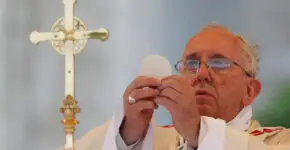In 1981 Pope John Paul II wrote an Apostolic Exhortation, Familiaris Consortio (The Fellowship of the Family) subtitled “On the Role of the Christian Family in the Modern World”. In this exhortation Pope John Paul II placed the family, quite correctly, at the centre of and the foundation upon which the Church and the society is built and thrives. Both Benedict XVI and Pope Francis in their emphasis on the New Evangelization and the Church’s Mission have again pivoted everything in the life and role of the Christian family towards this end. St. John Paul II described the family as an “intimate community of life and love” (Familiaris Consortio #50).
He says in Familiaris Consortio #17, “The family finds in the plan of God the Creator and Redeemer, not only its identity, what it is, but also its mission, what it can and should do. The role that God calls the family to perform in history derives from what the family is. Its role represents the dynamic and existential development of what it is. Each family finds itself a summons that cannot be ignored, and that specifies both its dignity and its responsibility: family, become what you are.” In the final analysis the essence and the role of the family is specified by love. The consequence of this, as we shall see shortly, is that the extent to which the Catholic family accepts the Gospel, matures in faith, and lives its vocation to love, it becomes an evangelizing community, the Church on Mission.
The Christian family is the Domestic Church. It is here that seeds of love and faith are sown and nurtured into maturity as the family grows together. The family is the load bearing wall of civilization, its strength determines whether civilization and the church stand or fall. This became very clear when Covid-19 shut down cities, churches, and all forms of normal social activity. It was the family, the domestic church that emerged as the foundation of all church life. It was in the family home (Domestic Church) that faith was nurtured, and persons sought refuge from what threatened them. The post Covid-19 world we are re-entering now is different to the one we left behind pre Covid-19 in critical ways, and this offers an opportunity, along with the Synodal process, for a meaningful redefinition of our pastoral focus. The focus of all pastoral initiatives must now be the family i.e., the Domestic Church.
“Missioning the family first requires that we help families understand and live their identity.” “What is the family? First of all, it is a Domestic Church. Everything done in the Church, parish or universal, we also do in the family. In both spaces we find mission, sacrifice, blessing, calling forth the gifts of others, prayer, daily offering and encouraging each other to sacrifice”. (Missioning the Domestic Church pg. 26). The key practices of the Domestic Church are those of the Parish and the Diocese as in Acts 2:42 “They devoted themselves to the Apostles’ teaching and to fellowship, to the breaking of the bread and to prayer.” Devotion to prayer conveys diligence, consistency of action with love and affection. It was not a duty, but a commitment born of love. Devotion to the teaching of the Apostles is to want to be formed and informed by the Church and her teachings. This requires docility of heart and curiosity of spirit. Fellowship (Koinonia) is sometimes translated as “communion” or “participation” as in 1 Corinthians 10:16-17. This is about the radical way we are called to become one body in Christ. The Domestic Church must also become a sacrament of unity. The breaking of bread refers to the Eucharist and so we need to encourage families to participate in the Sunday Eucharist as families and to prepare for it with great devotion. Prayer is the lifeblood of a disciple. It is our vital connection to Christ. In the early church, prayer was both communal and private. It was in the temple and in the house. Prayer needs to be a staple of the family’s daily life as it was for Jesus (Luke 6:12, 22-45) and the early church (Acts 1:14). Its members need to pray individually, together as a family and with all families as parish.
As we engage life as a Diocese in 2023, let us all refocus our efforts to enable the Catholic family in our midst once again to claim its rightful place at the centre of the Church’s life and mission. The family unit is being attacked and eroded before our very eyes, but we cannot let this happen. All of our efforts must now be directed to family life if we are to survive and to thrive as a church and as a society. Let us all make a commitment to this end as we continue our Synodal journey and discern where the Spirit is leading us.
Peace and Blessings.
Your Servant in Christ,
Bishop Robert A. Llanos
Diocese of St. John’s-Basseterre












